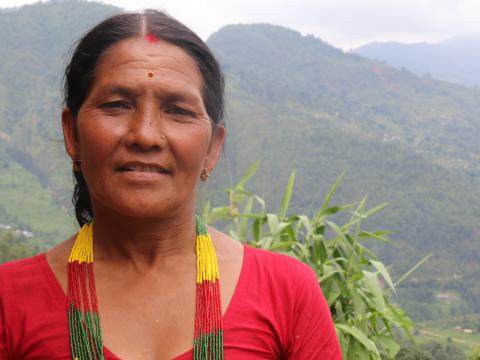Health Volunteers learn about first aid and disaster preparedness

First aid and disaster preparedness training was one of the trainings provided to Female Community Health Volunteers (FCHV), counsellors and health workers in Pipaldanda, Sindhupalchowk, in order to build their ability to care minor injuries and disaster preparedness.
44-year-old Okha Kumari is one of the FCHVs who is glad to have received this training which she thinks is very important in a disaster-prone community like Nepal.
Lack of proper knowledge about how to reduce the risk of a disaster is often why a disaster can be more exacerbating. Okha Kumari understands that this lack of information was one of the prime reasons why the people in her community faced so many problems in health and safety when the earthquake hit.
"We were not prepared for the earthquake. And after the earthquake hit, we did not know what to do and that we should be prepared to live in a temporary shelter, considering the safety and hygiene."
From the training, she has understood that a disaster never comes with an alarm and everyone needs to be prepared with emergency plans, clothes, medicine, baby food, and some cash in hand.
Elaborating on what she learnt from the training, she says, "I have learnt about the things that should be considered while living in the temporary shelter, including safe site selection, separate living space for men and women if living in a mass, as well as the need to maintain hygiene to ensure good health to prevent the outbreak of disease."
With the first aid training, she has also learnt about the ways to treat injuries like minor wounds and burn cases.
Okha Kumari and other FCHVs like her are disseminating what they learnt among the women’s group who take part in Women, Adolescent and Young Child Space (WAYCS) sessions, the mother's group at their monthly meetings as well as in door-to-door visit.
Bimala (26) is another counsellor who received training on first aid and disaster preparedness. Stressing the benefits of this training she says, "It was new and very useful for us as we knew about the initiatives we can take to be better prepared to tackle a disaster."
After this training Bimala has prepared a bag which includes clothes and a hygiene kit for her baby for any emergency situation. However she thinks that the component of disaster preparedness should be further strengthened since her community is very prone to disasters like landslide and earthquake.
To date more than 200 FCHVs have been trained in the districts where World Vision's earthquake response work is being carried out: Dhading, Dolakha, Sindhupalchowk, Nuwakot, and Gorkha.